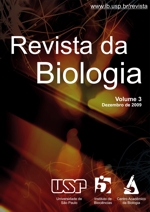Insetos Eusociais e o desafio para a idéia de seleção natural
DOI:
https://doi.org/10.11606/issn.1984-5154.v3p6-8Palavras-chave:
Seleção natural, Seleção de parentesco, HamiltonResumo
Este texto versa sobre a clássica discussão a respeito da dificuldade que a teoria da Seleção Natural tem em explicar o surgimento de indivíduos não férteis. Para tanto é apresentado o conceito de eusocialidade, as idéias de seleção de parentesco, altruísmo, altruísmo forçado e seleção de grupo.
Downloads
Referências
Alexander, R. (1974). The evolution of social behaviour. Annual Review of Ecology and Systematics.
Arillo, A. (2007). Paleoethology: fossilized behaviours in amber. Geologica Acta 5, 159-166.
Boomsma, J. J. e Ratnieks, F. L. W. (1996). Paternity in eusocial Hymenoptera. Philosophical Transactions Of The Royal Society Of London Series B-Biological Sciences 351, 947-975.
Chaline, N., Martin, S. J. e Ratnieks, F. L. W. (2004). Worker policing persists in a hopelessly queenless honey bee colony (Apis mellifera). Insectes Sociaux 51, 113-116.
Darwin, C. (1859). The origin of species (By Means of Natural Selection). London: John Murray.
Foster, K. R., Gulliver, J. e Ratnieks, F. L. W. (2002). Worker policing in the European hornet Vespa crabro. Insectes Sociaux 49, 41-44.
Foster, K. R. e Ratnieks, F. L. W. (2000). Social insects - Facultative worker policing in a wasp. Nature 407, 692-693.
Foster, K. R. e Ratnieks, F. L. W. (2001). Convergent evolution of worker policing by egg eating in the honeybee and common wasp. Proceedings Of The Royal Society Of London Series B-Biological Sciences 268, 169-174.
Foster, K. R., Wenseleers, T. e Ratnieks, F. L. W. (2001). Spite: Hamilton's unproven theory. Annales Zoologici Fennici 38, 229-238.
Foster, K. R., Wenseleers, T. e Ratnieks, F. L. W. (2006). Kin selection is the key to altruism. Trends In Ecology & Evolution 21, 57-60.
Hamilton, W. D. (1964a). Genetical Evolution Of Social Behaviour 2. Journal of Theoretical Biology 7, 17-&.
Hamilton, W. D. (1964b). Genetical Evolution Of Social Behaviour I. Journal of Theoretical Biology 7, 1-&.
Ratnieks, F. L. W. (1988). Reproductive Harmony Via Mutual Policing By Workers In Eusocial Hymenoptera. American Naturalist 132, 217-236.
Ratnieks, F. L. W. (1991). Evolution Of Discriminatory Aggression In Marine-Invertebrates. Journal of Theoretical Biology 152, 557-565.
Ratnieks, F. L. W. e Reeve, H. K. (1992). Conflict In Single-Queen Hymenopteran Societies - The Structure Of Conflict And Processes That Reduce Conflict In Advanced Eusocial Species. Journal of Theoretical Biology 158, 33-65.
Ratnieks, F. L. W. e Visscher, P. K. (1989). Worker Policing In The Honeybee. Nature 342, 796-797.
Ratnieks, F. L. W. e Wenseleers, T. (2005). Policing insect societies. Science 307, 54-56.
Ratnieks, F. L. W. e Wenseleers, T. (2008). Altruism in insect societies and beyond: voluntary or enforced? Trends In Ecology & Evolution 23, 45-52.
Wenseleers, T., Badcock, N. S., Erven, K., e col. (2005). A test of worker policing theory in an advanced eusocial wasp, Vespula rufa. Evolution 59, 1306-1314.
Wenseleers, T. e Ratnieks, F. L. W. (2006). Enforced altruism in insect societies. Nature 444, 50-50.
Wenseleers, T., Ratnieks, F. L. W. e Billen, J. (2003). Caste fate conflict in swarm-founding social
Hymenoptera: an inclusive fitness analysis. Journal Of Evolutionary Biology 16, 647-658.
Wilson, D. S. e Wilson, E. O. (2007). Rethinking the theoretical foundation of sociobiology. Quarterly Review of Biology 82, 327-348.
Wilson, E. O. (1971). The insect societies. Cambridge, MA: Belknap Press of Harvard University Press.
Wilson, E. O. (2008). One giant leap: How insects achieved altruism and colonial life. Bioscience 58, 17-25.
Wilson, E. O. e Holldobler, B. (2005). Eusociality: Origin and consequences (vol 102, pg 13367, 2005). Proceedings of the National Academy of Sciences of the United States of America 102, 16119-16119.
Downloads
Publicado
Edição
Seção
Licença
Copyright (c) 2009 Pedro Leite Ribeiro

Este trabalho está licenciado sob uma licença Creative Commons Attribution 4.0 International License.
Salientamos que nossa revista não detém copyright, estes são exclusivos do autor do texto. Pretendemos com isso não criar entraves ao acesso do material publicado e atingir com mais intensidade nosso objetivo de divulgação da ciência.








 revistadabiologia@ib.usp.br
revistadabiologia@ib.usp.br 2008 - 2024 Revista da Biologia
2008 - 2024 Revista da Biologia